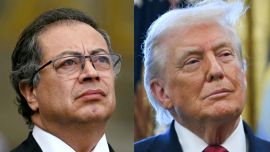Argentina investors are preparing for a 44 percent devaluation of the country’s official exchange rate after Javier Milei’s inauguration on December 10.
While the incoming president’s team has signalled it won’t lift currency controls right away and seemingly delayed plans to scrap the peso altogether, the current level of the Argentine currency is largely seen as unsustainable. Markets are signalling a drop of about 27 percent on Monday, while investment banks like JPMorgan Chase & Co and local private advisory firms suggest it will eventually weaken some 44 percent as Milei prepares to unwind capital controls that have spawned a hodgepodge of exchange rates.
“We expect an FX realignment to adjust relative prices, permitting a gradual capital controls phase-off,” JPMorgan economists Diego Pereira and Lucila Barbeito wrote in a research note.
While the magnitude of the devaluation is unclear, the policy “should be coupled with a draconian fiscal adjustment” to offset revenue losses and create incentives to start rebuilding the Central Bank’s reserves, they wrote, adding that dollarization doesn’t seem to be a priority as of now
One-time congressman Milei, who pledged a radical overhaul to quell inflation that’s running at more than 140 percent, has toned down his fiery rhetoric since winning the November 19 run-off. He promised his government would meet its debt obligations and sought to dispel fears about governability, seemingly abandoning more controversial proposals and surrounding himself with Wall Street veterans who also served in the administration of former president Mauricio Macri.
Milei picked Santiago Bausili, a close friend of incoming Economy Minister Luis Caputo, to lead the nation’s Central Bank. The nomination, which needs to be approved by the Senate, broadens the powers of the economic team Caputo is building to implement austerity measures and fight inflation. It also signals the new government isn’t planning to have an independent monetary authority for now.
Market signs
Markets are signalling traders will sell pesos at 500 per dollar Monday, from the current official rate of 363 pesos, according to people familiar, who cited Siopel pricing and asked not to be named because the information isn’t public.
Assets like dollar-linked bonds are currently being sold at around 600 pesos per dollar, while peso futures negotiated at the Rofex exchange indicate that it will depreciate to 741 pesos per dollar by the end of December.
“A reasonable value of the exchange rate could be at 600 to 650 pesos per dollar,” Guillermo Francos, one of Milei’s closest advisers, said during a TV interview over the weekend. Francos, who is focused on building political alliances and is not part of the economic team, also added that the number takes into account the peso’s historical value in real terms.
A spokesperson for Milei’s office declined to comment.
If confirmed, the devaluation would narrow the gap between the official peso and the country’s parallel rate used to skirt currency controls, which is currently trading near 963 per dollar.
The weaker rate would be similar to the one that exporters have access to under existing capital controls, which allows some of them to sell half of the currency reserves they receive in parallel markets.
“There will be an official devaluation and the exchange restrictions would be maintained for the companies,” said Marcos Buscaglia, co-founder of consulting firm Alberdi Partners.
by Ignacio Olivera Doll & Kevin Simauchi, Bloomberg





















Comments